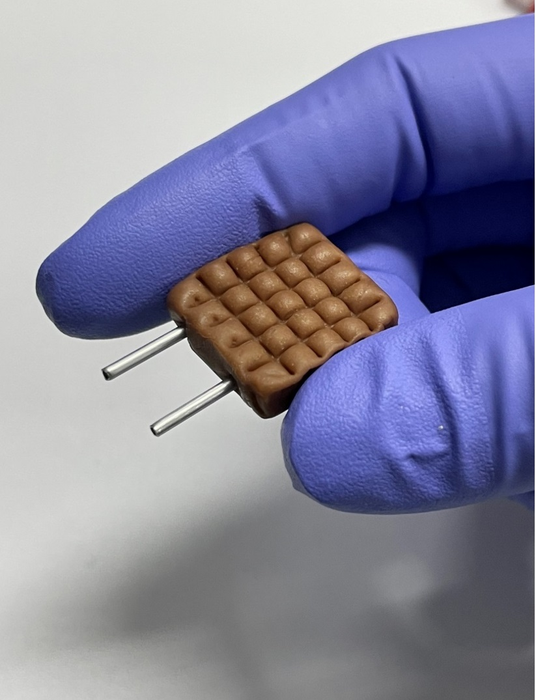Single-use diagnostic tests often aren’t practical for health professionals or patients in resource-limited areas, where cost and waste disposal are big concerns. So, researchers reporting in ACS Applied Materials & Interfaces have turned to a surprising material, Tootsie Roll® candy, to develop an inexpensive and low-waste device. The candy was used as an electrode, the part of the sensor that detects salt and electrolyte levels in saliva, to monitor ovulation status or kidney health.

Credit: Adapted from ACS Applied Materials & Interfaces 2021, DOI: 10.1021/acsami.1c11306
Single-use diagnostic tests often aren’t practical for health professionals or patients in resource-limited areas, where cost and waste disposal are big concerns. So, researchers reporting in ACS Applied Materials & Interfaces have turned to a surprising material, Tootsie Roll® candy, to develop an inexpensive and low-waste device. The candy was used as an electrode, the part of the sensor that detects salt and electrolyte levels in saliva, to monitor ovulation status or kidney health.
Disposable test strips have advanced the speed and accuracy of at-home health monitoring. For example, ovulation predictor kits measure luteinizing hormone levels, and there are test strips that measure creatinine levels for patients with chronic kidney disease. However, their costs add up quickly and, between the packaging and the strips themselves, there’s a lot of waste that needs to be disposed of. Previous researchers have indicated that simple measurements of a person’s salivary salt and electrolyte content could be appropriate for managing some conditions. So, Beelee Chua and Donghyun Lee wanted to repurpose unconventional and widely available materials, including electrically conductive soft candies, into an easily accessible, low-waste sensor that could simply be licked by patients to analyze their saliva.
To make the prototype sensor, the researchers first flattened a Tootsie Roll® and pressed crevices into its surface in a crosshatched pattern to hold the saliva sample. Then, they inserted two thin, reusable aluminum tubes, which acted as electrical contacts, connecting the candy electrode into a circuit with a current source and an output voltage detector. In preliminary tests, the device could measure salt levels that were physiologically relevant for health monitoring in a salt-water solution and artificial saliva. For example, when covered in diluted artificial saliva, the sensor could reliably measure a change in voltage low enough to detect the 10-30% drop in salts that occurs when a person ovulates. While the maximum salt content in the artificial saliva samples was similar to that of a healthy adult, the researchers used calculations to estimate that conductivities three times higher, which signal a problem with the kidneys, would be within the measurable range of the device. Although testing with real human samples is still needed, the researchers say that using soft candy as electrodes opens up the possibility for low-waste, inexpensive electrochemical sensors and circuits in the future.
The authors acknowledge funding from the National Research Foundation of Korea.
The abstract that accompanies this paper can be viewed here.
The American Chemical Society (ACS) is a nonprofit organization chartered by the U.S. Congress. ACS’ mission is to advance the broader chemistry enterprise and its practitioners for the benefit of Earth and all its people. The Society is a global leader in promoting excellence in science education and providing access to chemistry-related information and research through its multiple research solutions, peer-reviewed journals, scientific conferences, eBooks and weekly news periodical Chemical & Engineering News. ACS journals are among the most cited, most trusted and most read within the scientific literature; however, ACS itself does not conduct chemical research. As a leader in scientific information solutions, its CAS division partners with global innovators to accelerate breakthroughs by curating, connecting and analyzing the world’s scientific knowledge. ACS’ main offices are in Washington, D.C., and Columbus, Ohio.
To automatically receive news releases from the American Chemical Society, contact [email protected].
Follow us: Twitter | Facebook | LinkedIn | Instagram
Journal
ACS Applied Materials & Interfaces
DOI
10.1021/acsami.1c11306
Article Title
“Soft Candy as an Electronic Material Suitable for Salivary Conductivity-Based Medical Diagnostics in Resource-Scarce Clinical Settings”
Article Publication Date
10-Sep-2021




